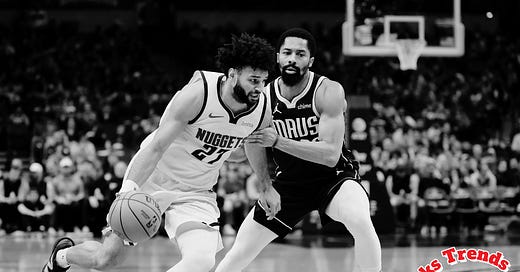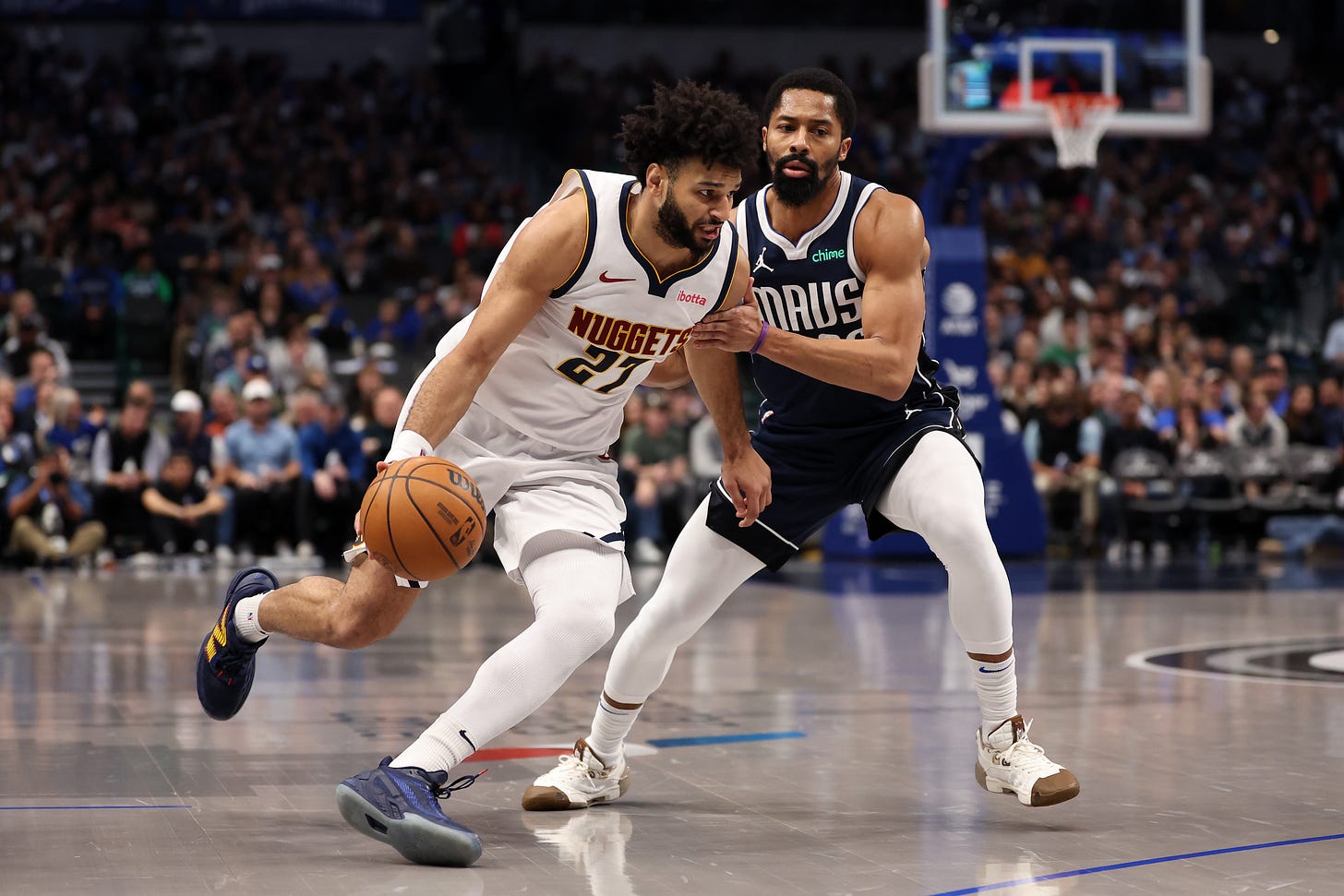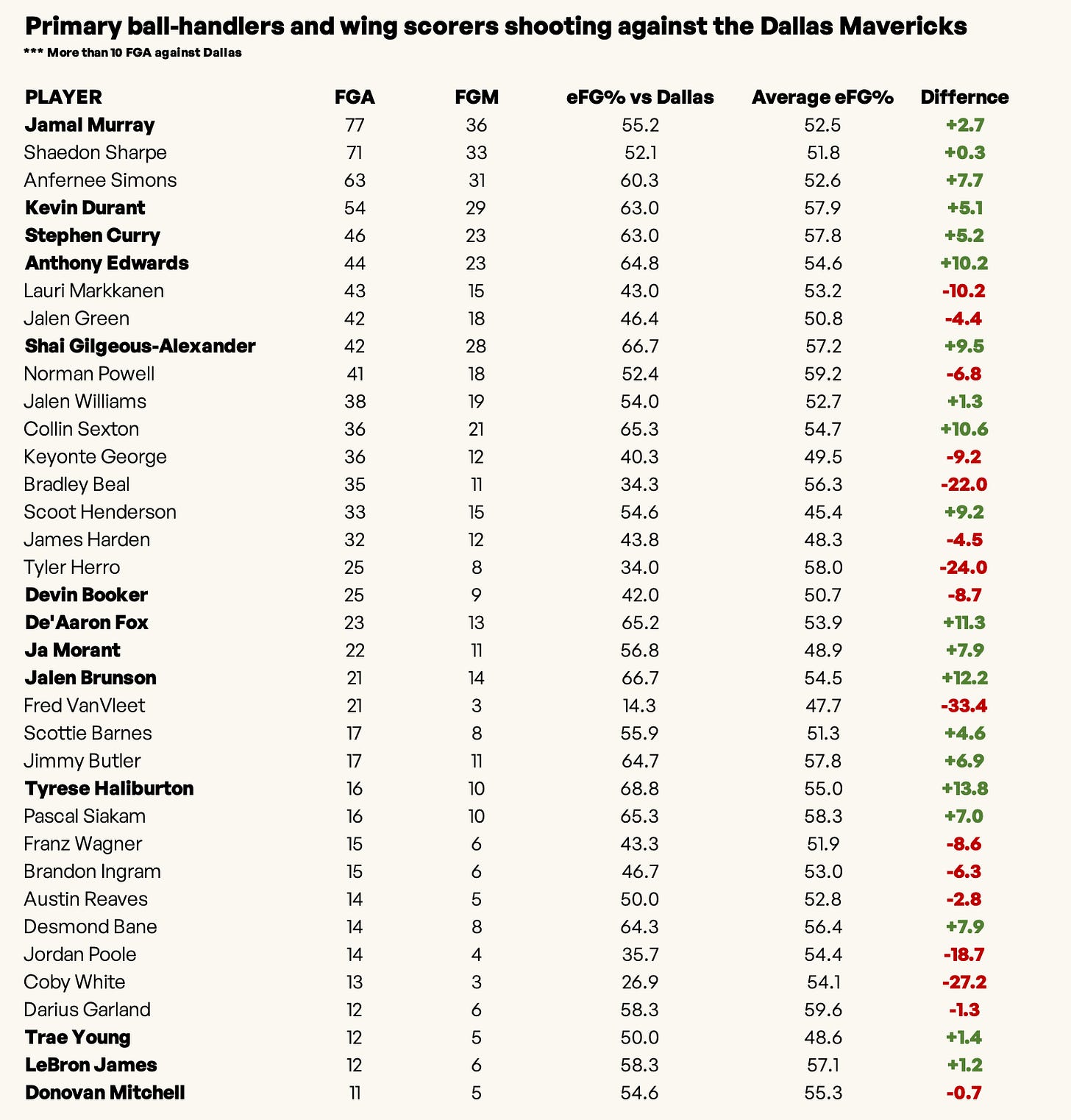It’s not often that I deviate from the usual format of game observations. I aim to keep things consistent, focusing on uncovering interesting patterns and positive trends—even after tough losses.
The last time I stepped away from the norm was when the Mavericks hit their low point earlier this season, losing to the Utah Jazz and dropping to 5-7. That game felt like a crossroads.
After last night’s disappointing no-show, a 118-99 defeat to the Denver Nuggets, I’ll do it again.
Before diving into the key issue, let’s address the game itself. For starters, it seems the Mavericks just can’t catch a break with injuries. On the same night they got Kyrie Irving back, Dereck Lively II went down with a sprained ankle just four minutes into the game. That, along with a couple of bad fouls by P.J. Washington, forced Jason Kidd into early substitutions, and the defense, without its two key defenders, quickly fell apart.
As bad as the defense was, the offense looked even worse. Irving had an off night, shooting just 4-of-18 and looking rusty in his return. Nobody else came close to having a good game. Add to that another Denver’s dominance on the offensive glass, and you had a game decided by the middle of the third quarter, with the Nuggets’ lead ballooning to as much as 31. The Mavericks lost both games in the home-and-home mini-series, a painful reminder of the opportunity lost on Sunday.
No On-Ball Pressure, No Force: A Troubling Defensive Pattern
Yesterday, I published the first article in the Trade Deadline Series, evaluating the Mavericks’ roster, contracts, and both short- and long-term plans. After posting it, I had some second thoughts, wondering if my obsession with on-ball pressure and defense, which I identified as the key gap to fill at the deadline, is irrational. I just love watching players like Jrue Holiday, Lu Dort, Jalen Suggs, or Dillon Brooks apply on-ball pressure, disrupt initial actions, and make opposing superstars work for every point. Then, after watching last night’s game, where the contrast in perimeter pressure was so obvious once again, it only reinforced my roster assessment.
Jamal Murray scored a season-high 45 points—the highest output by any player against the Mavericks this season—and became the latest in a growing line of opposing ball-handlers having a field day scoring against Dallas.
Similar issues were glaring in the two games against Oklahoma City, where Shai Gilgeous-Alexander averaged 38 points on an absurd 67% effective field goal percentage. It’s easy to brush that off, thinking SGA is torching everyone and playing at an MVP level, but it wasn’t an isolated case.
Anthony Edwards, Kevin Durant, Steph Curry, De'Aaron Fox, Tyrese Haliburton, Ja Morant, Jimmy Butler, and Jalen Brunson all come to mind as other ball-dominant players who have faced the Mavericks—and as the data shows, each had a highly efficient shooting night against them.
If you dive into the shooting data, Devin Booker is the only top-tier guard or wing scorer who has struggled against Dallas this season. James Harden, Jalen Green, and Tyler Herro are the three most notable names the Mavericks have defended well against, but they’re not on the same level as the players I mentioned earlier.
The Dončić effect and offensive-minded guard minutes and archetype
Of course, NBA defense isn’t as simple as assigning your best defender to guard the opposing team’s top scorer one-on-one. Teams constantly run actions designed to force switches and attack weaker defenders, or to trigger rotations and exploit a scrambling defense in actions that follow.
The problem for Dallas—one that was magnified by Luka Dončić’s absence—is that they’re playing a lot of lineups with perimeter defenders who either aren’t consistently applying pressure on every possession, like Irving and Thompson at this stage of their careers, or are simply poor defensive players, such as Dinwiddie and Hardy. All are also below average rebounders.
Irving, Thompson and Dinwiddie are three of the top four players in total minutes so far this season, and Hardy already logged 500 minutes. Irving, Thompson, and Dinwiddie are three of the top four players in total minutes for the Mavericks so far this season, and Hardy has already logged more than 500 minutes.
The Mavericks have had to rely heavily on Dinwiddie and Hardy to fill the playmaking void created by the absences of Dončić and Exum. But injuries happen, and when they do, the end-of-the-roster spots become crucial. The Mavericks have filled those spots with a surplus of guards who fit a similar mold—undersized and lacking defensive pressure—such as Hardy, Dinwiddie, Brandon Williams, and Jazian Gortman.
For some of those spots, having a defensive-minded guard—someone like Kris Dunn or even Dennis Smith Jr.—to be able to mix things up is what the roster is missing and maybe something to address at the deadline.
NOTE: If you missed the first article in my Trade Deadline Series, which includes a full roster evaluation and a look at future plans, you can find it [here]. I’ll dive deeper into potential player targets in upcoming articles as we approach the February 6th deadline.








Thanks for another great article Iztok. How do you weigh what we see now from the mavs, versus what we saw when they were (mostly) healthy & winners of 14 of 17? During that span top 5 in off/def/NET & just outside the top 10 in def. It accounted for just under a quarter of the szn.
That game was hard to watch for sure! The chart of eFG% was very interesting and helped with understanding what the real problems are.
There also seems to be a pattern with this team that when they are shooting well, they give a better defensive effort. They couldn't shoot and didn't defend last night.
Has there been any indication of a time frame for Luka's return?